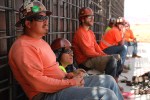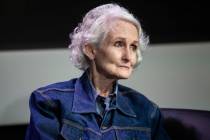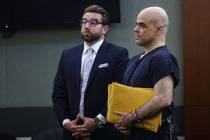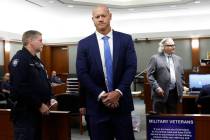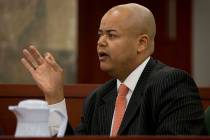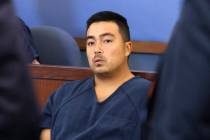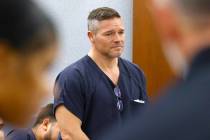Politicians to test Nevada justices on hot issues
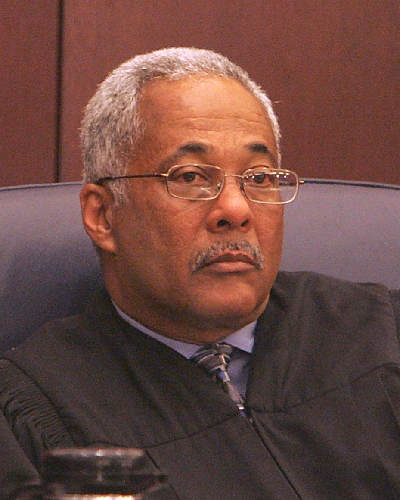
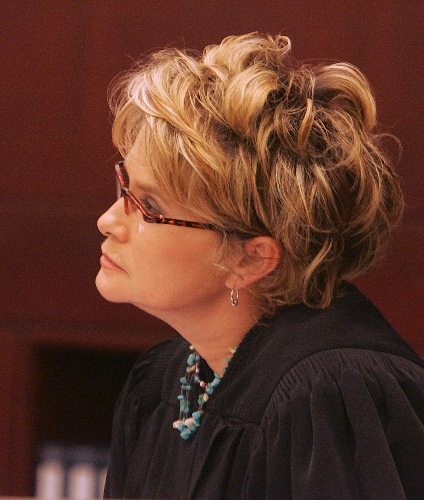
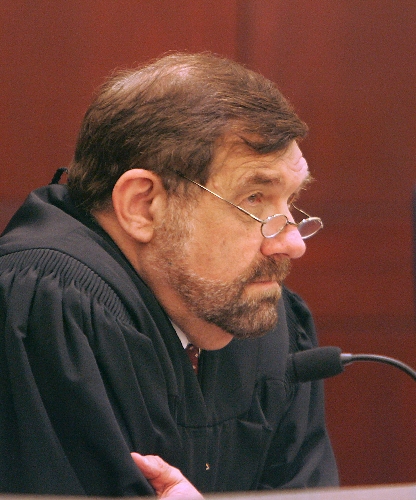


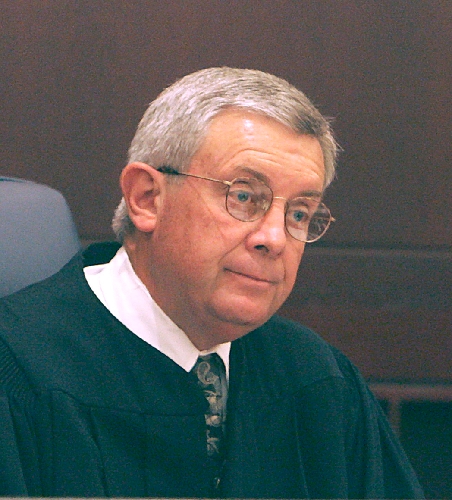
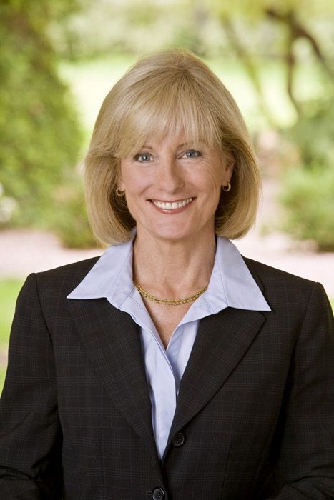
Nevada Supreme Court justices have a sworn duty to stand above politics and base their decisions not on personal opinions or party ideology, but solely on the U.S. and Nevada constitutions and the rule of law.
That duty will be challenged Tuesday when lawyers for the state’s Democratic and Republican parties square off over one of the most politically charged cases in recent memory.
They will argue over how to best fill the 2nd Congressional District seat vacated by Dean Heller, who was tapped to replace U.S. Sen. John Ensign. Ensign resigned in disgrace in May, roughly a year after admitting to an affair.
And later this year, the state high court will get involved in another hot political issue if a District Court judge in Carson City fails to please Republicans and Democrats in breaking an impasse over drawing new maps to ensure equal representation in congressional and state legislative districts.
All of this is prelude to a single question: How will these learned black-robed men and women handle these two critical issues?
Court insiders say those who expect justices’ personal politics to hold sway over their opinions are in for a rude awakening.
A special election to fill the last year of Heller’s House term is tentatively scheduled for September, and the state high court will play a crucial role in determining what the ballot will look like.
Republicans want each state party to pick its candidate, figuring that will ensure their candidate will win the seat in the special election and get a leg up on winning the 2012 regular election by being the incumbent.
The 2nd Congressional District is heavily Republican.
Democrats favor Secretary of State Ross Miller’s finding that multiple candidates from any party should be on the ballot.
No Democrat has ever been elected in the 2nd District, which encompasses all of Northern Nevada and rural Clark County. And if a dozen Republican candidates are allowed to split the ticket, a Democrat running an aggressive campaign could eke out a win.
Should the court side with the Republicans, the main political parties already have their candidates picked.
The Republican Central Committee in a landslide vote June 18 picked former state Sen. Mark Amodei, of Carson City, to be its candidate.
The Democratic Central Committee picked State Treasurer Kate Marshall of Reno as its candidate on Saturday .
REDISTRICTING
Every 10 years, the Legislature is tasked with redrawing political district boundaries for Assembly, state Senate and Congress following results of the U.S. Census.
This time around, it will be 42 Assembly, 21 state Senate and four congressional districts. The fourth congressional seat was added because of Nevada’s population growth.
If politics is allowed to control the process, the dominant party could get more seats in the Legislature and Congress than its population merits, and that could shift government policies in ways that most Nevadans don’t support.
This session, legislative Democrats who controlled both houses failed to pass a redistricting plan that gained Gov. Brian Sandoval’s support.
Sandoval vetoed the proposals, a lawsuit was filed, and the challenge ended up in Carson City District Court.
The case is expected eventually to be decided by the state high court, which could kick the reapportionment responsibility back to the Legislature or draw the district boundaries itself.
"What I hear is both parties proposed pretty outrageous political maps," said Jeffrey Stempel, a law professor at the Boyd School of Law at the University of Nevada, Las Vegas.
These types of disputes are not rare following a decennial census, he said, but the facts behind the Nevada case are unique.
Stempel said courts elsewhere have been asked to review already approved political maps to ensure minorities are not disenfranchised and to avoid obvious gerrymandering, the practice of tailoring districts based on politics.
Redistricting is a critical component to a democracy as it ensures equal representation based on the doctrine of one person, one vote.
FAITHFUL TO CONSTITUTION
Stempel and another expert who closely watches the state’s high court expect decisions on these two cases to be based on the law, not politics.
"They generally play it straight," said Stempel, who said the current crop of justices is hard to pin down politically if you examine their formal written opinions.
"I can’t tell if they’re liberal Republicans or moderate Democrats," he said.
For the record, there are four registered Democrats: Chief Justice Michael Douglas and Justices Michael Cherry, Nancy Saitta and James Hardesty; and three Republicans: Justices Mark Gibbons, Ron Parraguirre and Kris Pickering.
But, as Stempel said, one could look at the decisions they hand down "in case after case and still wouldn’t have any idea how they voted on Election Day."
The hyperpartisanship seen in the Legislature simply does not exist on the state high court, and it shouldn’t, he said.
The proof can be found in another political case heard May 26 when the court sided with the soon-to-be-defunct Clean Water Coalition, which along with the M Resort filed a lawsuit against the Legislature after lawmakers took $62 million in special fees that were collected from ratepayers to fund a sewage line in Clark County.
Lawmakers and the governor wanted the money placed in the general fund for the benefit of all Nevadans in the face of unprecedented budget woes. But the state high court ruled the money grab was essentially an illegal taking, since it came from special fees placed on specific home and business owners in Henderson.
The decision forced lawmakers to move in a different budget direction, and compelled Sandoval to extend more than $600 million in taxes that were supposed to sunset.
From a political standpoint, many GOP lawmakers and a handful of Democrats had to renege on their promises of no new taxes.
LESSONS OF GUINN
"These justices are legal realists," said Dan Polsenberg, a prominent appellate attorney who has appeared before the state high court countless times over three decades.
"If they were just going to be political hacks, they would have let the state take the coalition’s money," Polsenberg said. "I think they’re taking a good role."
Polsenberg remembers a time when the state high court was political and how judicial careers were ended or seriously harmed as a result.
In 2003, then-Gov. Kenny Guinn filed a lawsuit against the Legislature after lawmakers — in the middle of yet another fiscal nightmare — failed to fund a budget. Guinn wanted to raise taxes, but the state constitution says any increase requires a two-thirds vote, and lawmakers were at an impasse.
The constitution also requires that the budget be balanced and education be funded before anything else.
The issue was sent to the state Supreme Court, which hastily overrode the two-thirds majority requirement.
The ruling essentially abrogated one constitutional amendment, no new taxes without a supermajority vote, in favor of two others, funding education first and balancing the budget.
In short, the justices settled on political expediency rather than the rule of law, Polsenberg said.
"I was pretty hopping mad about it," he said of the 2003 case. "I don’t think they realized how activist they were being. They thought it was a constitutional crisis. Some of the less experienced justices thought they had to protect government from itself. They were told that school wouldn’t start.
"They didn’t realize lawmakers like to play chicken with each other and that they don’t turn away until the last second."
Gibbons is the lone holdover from the 2003 court. The rest resigned or were voted out, and the case and its fallout remain fresh in the court’s collective mind.
The lesson learned was obvious: Justices must be objective and apolitical.
Gibbons rejected his initial opinion and led the charge to repeal Guinn v. Legislature in 2006.
Douglas matched this sentiment in an address to lawmakers in March. Explaining the duties of the state high court — to interpret and honor laws — he said the judicial branch "must be independent of politics and personalities and concerns as to public popularity."
He said the court has "one true allegiance and that is to the Constitution and the rule of law."
QUESTION OF JURISPRUDENCE
The justices are a good mix of conservative, moderate and liberal ideologies, but their formal opinions tend to reflect the law and nothing else, Stempel said.
Polsenberg agrees. He suspects the state high court could avoid the appearance of impropriety that ended so many careers in 2003 by announcing a decision and then taking care to write the opinion.
"Part of the problem in 2003 was the court issued its written opinion very soon," Polsenberg said. "It looked like it was written by a committee inside a blender."
"We have a much more principled court now," he said, adding that the court also is more careful.
Polsenberg said Douglas understands what the law looks like to bureaucracies and also to the little guy fighting bureaucracies.
"There’s a lot going on inside Mike Douglas," he said.
Justice Ron Parraguirre is the most practical justice, he said, while Justice James Hardesty is the best prepared.
"He reads everything," Polsenberg said. "He really drills down to what the statute means."
Kris Pickering brings "heavy-duty legal analysis to bear." Polsenberg said Pickering is an expert at finding weaknesses in an argument.
Gibbons has the "keenest sense of fairness," according to Polsenberg, and works hard to improve the entire court system.
Cherry has the most varied legal experience and, while he is an advocate for the little guy, Polsenberg said he will "still reach the right result when the little guy is wrong."
He said Saitta has the ability to see the big picture as well as discrete points.
All of this does not mean the justices are apolitical in their private lives.
Pickering is probably the most conservative and Cherry the most liberal, but neither Polsenberg nor Stempel believes those tendencies will come into play.
Said Polsenberg: "I see them buckling down and doing the right thing."
Contact reporter Doug McMurdo at dmcmurdo@review journal.com or 702-224-5512.






